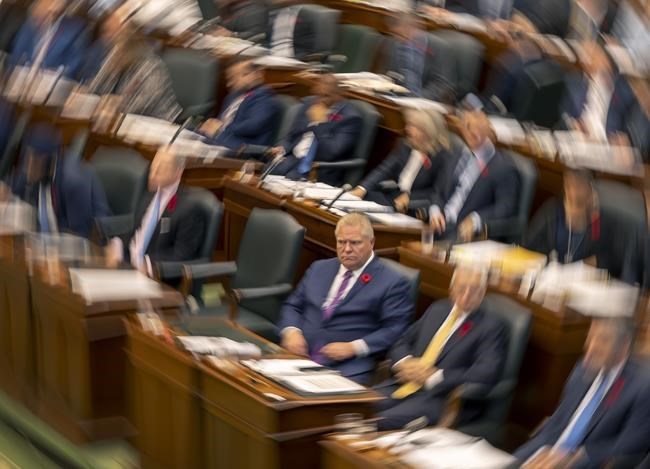TORONTO — Ontario's pre-emptive use of the notwithstanding clause in legislation intended to prevent a strike by education workers is a dangerous and draconian move that could have implications for labour negotiations across the country, experts say.
The Progressive Conservative government passed legislation Thursday that imposes a contract on education workers with the Canadian Union of Public Employees and bans them from striking. The legislation says the government intends to invoke the notwithstanding clause to keep the eventual law in force despite any constitutional challenges.
It's the first time in Ontario's history, and just the second time in Canadian history, that the controversial clause -- which allows the legislature to override parts of the Canadian Charter of Rights and Freedoms for a five-year term --has been used in back-to-work legislation.
"This intervention is incredibly dangerous because it is basically the government saying, we know we are violating these workers' constitutional rights, and we're going to do it anyways," said Stephanie Ross, the director of McMaster University's school of labour studies.
The use of the notwithstanding clause has roiled unions and shocked observers across the country, who fear it could embolden other governments to quash one of the most powerful pieces of leverage a union has in negotiations, without constitutional recourse.
The move not only has significant implications for other major education unions currently negotiating with the province, but for unions across the country, Ross said.
"I don't think any worker in Ontario or Canada should rest easy with the recourse to the notwithstanding clause to override workers' rights," she said.
While the Saskatchewan government invoked the notwithstanding clause in 1986 in strike-ending legislation, Ontario has taken the unprecedented step to include the clause in legislation before workers hit the picket line.
Education Minister Stephen Lecce has defended the use of the clause, saying it is to prevent disruptions to classroom learning because of strikes or litigation.
Despite the legislation, CUPE has said its 55,000 education workers, including custodians and education assistants, will strike Friday and "until further notice," risking fines imposed in the legislation of up to $4,000 per employee and $500,000 for the union per day.
Mediation between CUPE and the government concluded Thursday with no deal ahead.
Lecce had said he wouldn't negotiate further unless the union cancelled its strike.
In negotiations, the union had asked for annual salary increases of 11.7 per cent for its workers, who it says make on average $39,000 and are among the lowest paid in schools. The government has said the new, imposed four-year deal would give 2.5 per cent annual raises to workers making less than $43,000 and 1.5 per cent raises to all others, though the union has argued those figures are inflated.
The use of back-to-work legislation has been increasingly common since the 1980s, said Charles Smith, co-author of "Unions in Court," a history of the labour movement's engagement with the Charter. He said it eventually led the Supreme Court in 2015 to declare the right to strike as constitutionally protected.
Smith noted a union still must follow several steps before it can legally picket, including negotiations, a strike vote and a strike notice.
He called Ontario's move "extremely heavy-handed" and "draconian."
"The union played by the rules and the government is essentially rewriting those rules in its favour," said Smith, associate professor at St. Thomas More College at the University of Saskatchewan.
The Ontario Liberal government's 2012 back-to-work legislation imposing contracts on striking education workers and teachers was eventually found to have violated bargaining rights, with the government paying millions of dollars in compensation to the unions.
This time around, the government's use of the notwithstanding clause could be seen as a way to avoid those financial costs, said Alison Braley-Rattai, associate professor of labour studies at Brock University.
"It is hard not to read it any other way than wanting to dictate contract terms then not having to pay out the other end for a violation of their Charter rights," she said.
While the union has limited legal routes to contest the law, Braley-Rattai said the move could spark momentum for a larger political response.
"It takes the ability to organize quickly and comprehensively to capitalize upon that spark," she said.
Unions across the country have voiced solidarity with the CUPE education workers, calling on members to support an Ontario-wide protest on Friday and in some cases vowing to walk out themselves.
Canadian Labour Congress president Bea Bruske said in her 30 years in the labour movement, she does not "remember a time when there was this much immediate response to something that egregious."
She said along with joining picket lines, the congress has discussed possible work-to-rule measures.
"With this government, we have no choice but to look at every option possible as a fight back," she said.
"If other provinces adopt this kind of tactic, that's hugely problematic. But what I'm worried about is that it will also embolden employers to use a bully method, rather than coming to the bargaining table to actually be proactive."
Ross, the McMaster professor, said other support measures could include donations to CUPE or partial student and teacher walkouts. There is also the possibility of wildcat strikes -- informal, illegal actions where unionized workers strike without following the formal legal process.
But she said the first test of broader labour movement solidarity in this dispute will come Friday, if scheduled job action goes forward.
"We'll be watching to see not just how mobilized the union itself is but whether or not the broader labour movement comes out in support and in what numbers," Ross said.
This report by The Canadian Press was first published Nov. 3, 2022.
Jordan Omstead, The Canadian Press

